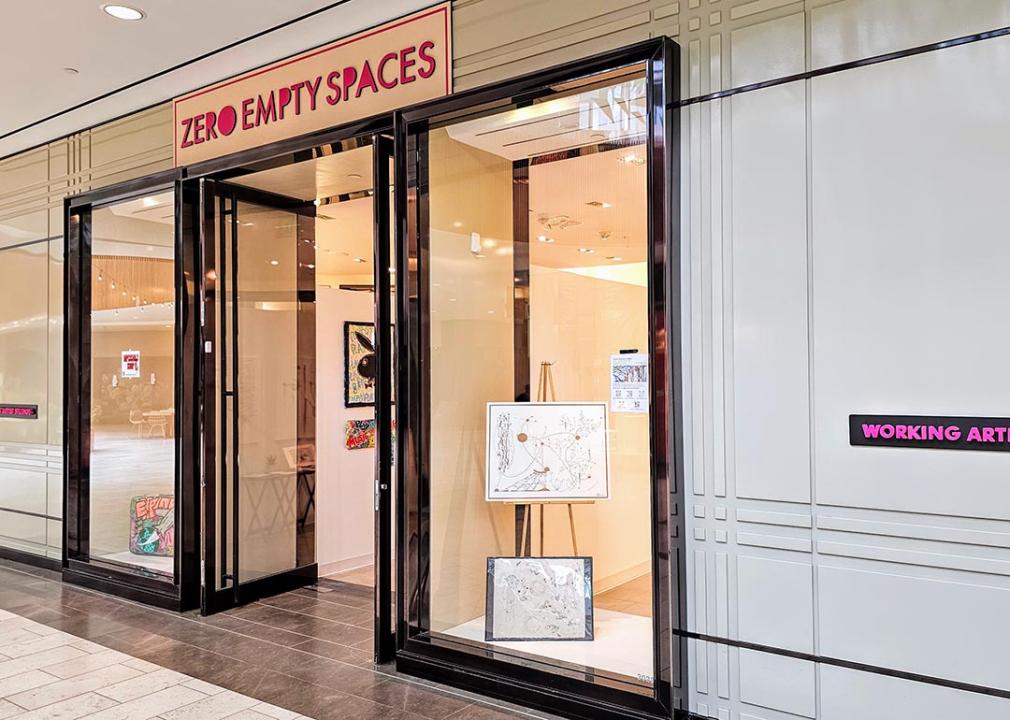
Since the pandemic, large swaths of office space across the United States have sat vacant. The downtown areas and other commercial centers that have enjoyed the built-in business that office workers bring have gone from bustling to bust.
At the beginning of 2024, 13.7% of office space was empty, while 7.6% of multifamily buildings, 4% of retail spaces and 5.6% of industrial spaces were vacant. As cities scramble to find creative new uses for these spaces, from climbing gyms to small-scale manufacturing to vertical farms, one organization in Florida has a stop-gap answer: Use the empty space for affordable artist studios.
Since launching in June 2019, Zero Empty Spaces has placed more than 600 artists in 10 commercial buildings in 10 cities, Next City reports. Most are in Florida but extend as far as Little Rock, Arkansas and Boston.
Placements last about 18 months on average, with some lasting for years. Artists pay between $2.50 to $4.50 a square foot, including all utilities, for spaces that range from 80 to 250 square feet. Artists must commit to working on at least one piece a month and being in the space at least one day a week between noon and 5 p.m.
Prior to the pandemic, Zero Empty Spaces co-founders Evan Snow and Andrew Martineau had already been working on innovative ways to bolster the arts in Florida's Broward County where they're based. "Our community has always been considered a cultural wasteland," Snow explains. "We're in between Miami to the south and Palm Beach to the north."
Having spent plenty of time in Miami's Wynwood Arts District, which helped turn the city's warehouses into a hotspot for the arts, Snow and Martineau decided to play on their community's water-based strengths and host art shows in mansions that could only be accessible by boat.
"Long story short, we did that for four years up until COVID," Snow says. By summer 2019, they had worked with more than 1,000 independent artists, many of whom lamented the perennial challenge of finding affordable studio space.
At the same time, brokers, developers and members of the county's real estate community were asking Snow and Martineau to host art shows in their commercial spaces.
"We saw all these 'For Lease' signs and said, what if we can make [Broward County] one of the most affordable places for artists to create and collaborate?" Snow says. Equipped with Martineau's background in retail development for shopping centers, which included vacancy management strategies that transformed vacant mall spaces into commission-free art galleries, the idea for Zero Empty Spaces was born.
The duo reached out to Fort Lauderdale's mayor and shared their idea to activate vacant commercial spaces to create affordable artist studios until permanent tenants could be secured. The mayor suggested reaching out to the man who held the most property in downtown Fort Lauderdale at the time. He happened to have a whopping 19 vacancies.
Zero Empty Spaces brought in nine artists to fill one of the developer's spaces, which had actually been an art studio originally. "We had one of the best attended grand openings in anything in Fort Lauderdale's history," Snow says of the event, which won local and national news coverage.
About three months into that activation, the landlord found a permanent tenant. "We just ask for a 30-day notice to vacate when that happens," Snow says.
Zero Empty Space's Boca Raton location is the largest single office facility in the state, according to Giana Pacinelli, director of communications for CP Group, the location's commercial partner. She tells Next City that working with the organization "has allowed us to activate our vacancies while bringing a special amenity to our existing office tenants."
Pacinelli says the tenants enjoy seeing the work of the 17 artists placed there as they move through the campus. They've ultimately developed their own relationships with the artists, even purchasing their work as gifts or for their personal collections. "The collaboration helps us develop a productive and creative ecosystem that tenants won't find at other office buildings, giving us a competitive advantage," she says.
Naturally, there are benefits enjoyed on the artists' side as well.
The emerging, mid-career and established artists Zero Empty Spaces works with are able to afford studio or gallery space in popular parts of town that would otherwise be unattainable. And in the process, they can enjoy opportunities that might otherwise evade them.
The Fort Lauderdale gallery, for example, was located on a street that Snow compares to Rodeo Drive. "Artists would never have been able to afford [space] there," he says. "Some of [our artists] have had tens of thousands of dollars of sales and made life-changing connections, gotten exposure to the press."
Most recently, Zero Empty Spaces is working to expand beyond in-person events. They're working to launch an online store so customers nationally and internationally can support their artists.
"It's going to be another 'win' scenario that helps artists sell and get discovered," Snow says.
This story was produced by Next City, a nonprofit newsroom covering solutions for equitable cities, and reviewed and distributed by Stacker Media.